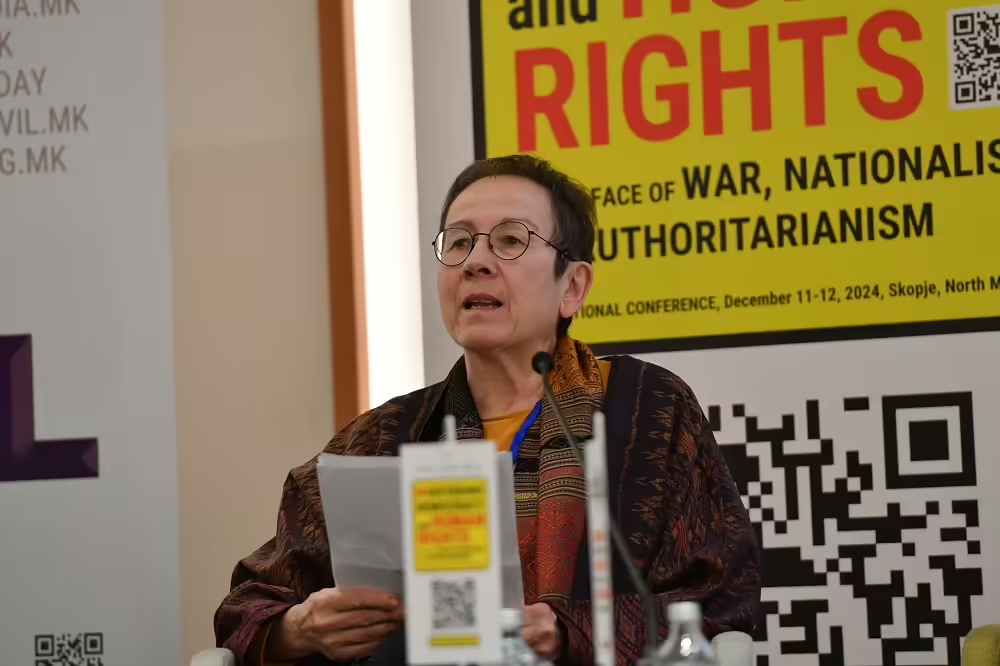At the International Conference “Defending Democracy: Battlefield of Truth”, held at the Hotel Continental in Skopje, North Macedonia, political leaders, journalists, civil society representatives, and educators from across Europe gathered to discuss the challenges of defending democratic values in the face of disinformation, hybrid warfare, and authoritarian threats, Mrs. Gudrun Steinaker, former ambassador to North Macedonia and several other countries, including Bulgaria and also the vice president of the Sudosteuropa Gesellschaft, the Southeast European Association from Germany, said she is calling from the annual academic week of the Southeast Europe Association in Tutsi in Bavaria, this year with the topic of the lessons from the Yugoslav wars.
Opening Remarks by Gudrun Steinaker
I am actually speaking to you now from the annual academic week of the Southeast Europe Association, which this year is taking place in Tutzing, Bavaria, under the theme “Lessons from the Yugoslav Wars.” And I truly hope that it will not take us another thirty years — as it did after the war in Bosnia — to organize a conference on “Lessons from the War in Ukraine.”
My main focus today, although I fully agree with the importance of culture and the preservation of cultural heritage in Ukraine, goes beyond that. Indeed, Ukraine faces a double challenge: not only the destruction of its cultural heritage by the direct impact of war, but also the lack of resources to continue cultural activities at home.
Many of these activities now take place abroad. In Austria, where I live, Ukrainian artists are supported by institutions such as the Institute for Human Sciences (IWM). Similar efforts are underway in Germany — through exhibitions, conferences, and concerts — and I sincerely hope that these initiatives will continue.
However, I would like to raise another issue that is very close to my heart, and that my colleague Jabir Derala knows well: the impact of war on nature and the environment. As a nature protection activist, I am deeply worried about the environmental consequences of the war in Ukraine. Much support is needed in this field as well. The EuroNatur Foundation, with which I am also involved, is working wherever possible to help protect Ukraine’s unique natural heritage. Sadly, the areas occupied or annexed by Russia are largely inaccessible, but we must not give up.
In Vienna, I am also active in a community initiative called “Ukraine in NATO” — a network that brings together Ukrainians living in Vienna and Austrian activists. We organize small-scale projects to support Ukraine in the fields of culture and education. For example, at the Maurer Center in central Vienna, we hosted a beautiful exhibition of children’s drawings created under the guidance of a Ukrainian artist who works with refugee children in Austria and regularly returns to Ukraine to continue her work.
I truly believe that art and creativity can help children confront and live with the trauma of war, and that these activities are essential to healing.
I would also like to emphasize another crucial issue — the one raised earlier by Dr. Resman — namely, disinformation.
I am part of a group of activists in Austria and Germany working to counter Russian disinformation, which is an integral part of the hybrid war. Just today, Dr. Thomas Brey, a long-time correspondent of the German Press Agency in Belgrade, gave a lecture at the German Foreign Ministry about Russian disinformation in the Balkans. As you can imagine, the situation is particularly serious in Serbia, but such propaganda is also spreading across the entire region.
This is why German institutions and organizations should support independent media and journalists in the Balkans in their fight against disinformation. The hybrid war is extremely dangerous, and we must do everything possible to expose and counter it.
Many ordinary citizens do not fully understand what is happening. We, as activists, are aware of it — but we must reach those who are confused, who are overwhelmed by the constant flow of conflicts and misinformation.
Right now, the war in Gaza is dominating public attention — especially in Germany, somewhat less in Austria — but the broader effect is confusion and disinformation. Many people cannot distinguish between the conflicts taking place simultaneously.
Just before coming to this conference, I spoke with a German journalist, and I found it nearly impossible to make him understand that, while the situation in the Middle East is tragic, the war in Ukraine is far from over and deserves equal attention. Russian drones continue to strike towns even in western Ukraine, near the borders; people are dying, homes are being destroyed, and cultural heritage is again being lost.
We must continue to remind our societies — and democratic countries in general — that this war is ongoing and that defending Ukraine means defending democracy and media freedom everywhere.
And finally, I must say that I am deeply concerned about the current situation in the United States, which will inevitably have consequences for the global fight against Russian aggression. We must remain vigilant and united, ensuring that our support for Ukraine — and for democracy itself — does not weaken.
The panel was held as part of the international conference “Defending Democracy: Battlefield of Truth”, organized within the framework of the project “Democratic Navigator”, with the support of the Federal Foreign Office of the Federal Republic of Germany.

